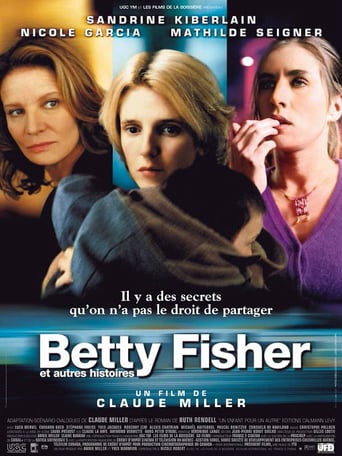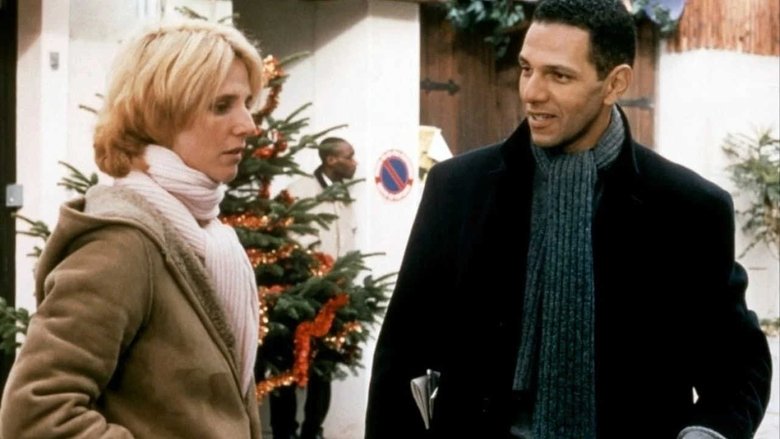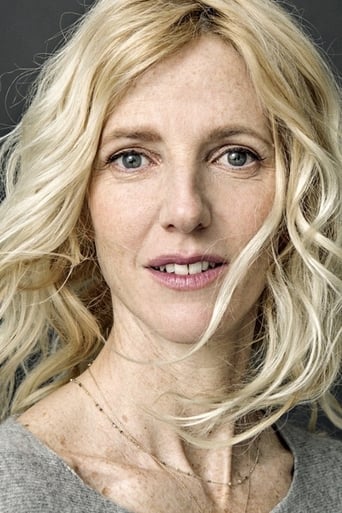

Betty Fisher and Other Stories (2001)
Grieving after the death of her young son Joseph, novelist Betty Fisher enters a dark depression. Hoping to bring her out of it, her mother Margot arranges to kidnap another child, Jose, to replace the son Betty lost. Although she knows it's wrong, Betty accepts Jose as her new son. Meanwhile, Jose's mother Carole is looking for her son with the help of her boyfriend Francois and some of his criminal cohorts.
Watch Trailer
Cast


Reviews
The superb acting of Sandrine Kiberlain and Nicole Garcia as apparent foils drives this film into a maze of suspense, illogic, and ironic twists that result in a cinematic synergism rarely achieved. As the plot develops it becomes virtually impossible to determine who is less sane. Betty's role, as portrayed by Kimberlain, is in many ways no more sane that that of Garcia's as her mother. In fact, as the film progresses, one wonders if Betty and her mother are indeed more alike than different. Kiberlain's restrained tolerance and Garcia's divine madness result in the creation of two characters the viewer will not soon forget, if ever.
(Note: Over 500 of my movie reviews are now available in my book "Cut to the Chaise Lounge or I Can't Believe I Swallowed the Remote!" Get it at Amazon.)I am somehow reminded in the storyline of this film of the work of mystery novelist Patricia Highsmith (The Talented Mr. Ripley; A Game for the Living, etc.) There is the same slightly genteel sense of mystery, realism and a women's point of view that characterizes Highsmith's work. In this case we have a young woman who loses her four-year-old son and then unexpectedly gains another. This intensely personal experience is set in the strata of contemporary French society. There are people in the projects, there is the underworld of petty criminals and prostitutes, and in contrast there are those who live in country homes beyond the suburbs. It is there that Betty, who is a novelist who has just published a best seller, lives.What director Claude Miller has done with this material is to make it dramatic and to tell the story through the medium of film. That may seem obvious, but how many film makers fail to understand the differences in media and end up with too much talk and too little use of the camera to good effect? Miller shows us commonplace scenes of the projects and contrasts them with the fine homes of the well-to-do. He shows us the long limbs and slightly gawky beauty of his star, Sandrine Kiberlain, who plays Betty, and he contrasts her to the fleshy woman of the streets and bars, Carole Novacki (Mathide Seigner) who is the mother of the boy that Betty gains. He also compares and contrasts the craziness of Betty's mother Margot (played with a fine fidelity by Nicole Garcia) with similar, more muted manifestations in Betty herself. There are interiors of luxury and grace, and those of people living temporary lives in high rise block apartments. One gets a sense of France in the twenty-first century adding texture and place to a woman's story that could happen in almost any city in the world.The opening scene shows Betty as a little girl on a train with her mother. We are told that her mother is suffering from some compulsive mental illness. We see her stab her daughter in the hand. And then we are fast-forwarded to the present and Betty is with her son Joseph, a scar on her hand, without a husband, going to her house in the countryside. Mother re-enters and we see that she is indeed a mental case, absurdity self-consumed and insensitive. When the boy falls out of a window and dies from the brain damage, Betty is in something close to catatonic shock, but her mother thinks only of her own welfare and seems indifferent to anything else.And then comes the twist.I won't describe what Margo does now because it is so interesting to see it unfold. At any rate, Betty is forced to come out of her depression and embrace new love and new responsibilities and to indeed commit a most criminal act, that of running away with another's child. And yet somehow we are made to feel--indeed the events of the plot compels us to feel--that she does the right thing in spite of her initial feelings and in spite of what would normally be right. Later on in the film there is another nice twist when the father of the dead boy returns and wants his share of Betty's success and fortune.What I think many viewers will appreciate here is that the players look and act like real people, not like people from central casting. Alex Chatrian plays the second little boy and he is a charmer, and beautifully directed by Miller. Kiberlain's laconic and wistful portrayal of a woman with so many choices won her Best Actress awards at the Montreal and Chicago film festivals. She has the kind of beauty that grows on you, yet is not glamorous or glittery, but when she smiles, as she so seldom does in this movie, she lights up the whole screen. And Seigner looks like a common woman, not like a Hollywood star dressed up like a prostitute.The men are also interesting and also very real. Luck Mervil, who plays Carole's boyfriend, is restrained like a volcano that one knows will eventually go off; and Stephane Freiss, who plays the father of the dead boy, and Edouard Baer who plays a scheming lower-class gigolo, are two very real varieties of men who prey on women.The ending is witty and satisfying, and I can tell that Claude Miller has seen Stanley Kubrick's The Killing (1956) starring Sterling Hayden since part of this scene recalls the finale in that American film noir with the money flying out of a suitcase during a chase scene at an airport. Or perhaps that bit is from Rendell's novel (which I haven't read) and it is she who recalls Kubrick's film.This is a thriller that manages to also be an engaging chick flick, if you will, a commingling of character and story that is in the best tradition of film making, and one of the best films I've seen in months.
"Alias Betty", a mediocre French flick which tells of a woman whose son dies and is replaced with a kidnapped kid by her mother and the ramifications of same and examinations of the goings-on in the lives of the people connected to the principals, this flick is a choppy and bland bit of nervous monotony and little more. Combine that with a subtitle a second such that it's difficult to study facial expressions and mannerisms and "Alias Betty" simply isn't worth the effort required. Recommended only for French film enthusiasts, French speakers, and fans of the principals and Miler's work. (C+)
I can now understand why authors feel leery about letting screenwriters adapt a novel. First of all, a full length novel doesn't translate well to the screen. There are too many nuances and too many details, that trying to do them all, will humble the most talented scribe.Take the case of the novel in which this film is based. The Tree of Hands by the magnificent British master of suspense, Ruth Rendell. The adaptation has nothing to do with the brilliant narrative she gave us with this novel. If anyone wants to see the best adaptation of a Rendell book, I would recommend to see Claude Chabrol's, "La Ceremonie".Not only was that a superior film, but it reveals the essence of the book with little effort. The problem with "Alias Betty" is Mr Miller's scenario. He has changed the basic premise of the book into something else. Now, don't get me wrong, it is a better film than some of the mediocrity coming from France lately.The big problem is with the character of the mother. Nicole Garcia is out of her range here. Not only that, one never understands what's wrong with her, even though she appears to be schizophrenic. She's a loose cannon up to no good. In the novel she's even more so. Betty is ambiguously played by Sandrine Kiberlain, which in a way, suits the character better. She is the only sane person around, even though she is unable to control the mother. The minor side plots add to the story, but everything at the end is resolved so easily that one wonders if anything like that is possible in life. The films end in an upbeat note, even though it has nothing to do with the original novel.




